Winning re-election while indicted is a rare feat in U.S. history.
But two Republican congressmen are attempting to do just that in November's midterm elections: Reps. Duncan Hunter of California and Chris Collins of New York.
After pleading not guilty in August to separate federal charges, both congressmen are entering the final weeks of the campaign doing what they can to lay low. They have largely avoided the media and refused to debate their opponents. Both declined repeated requests to comment for this story.
Instead, they have mostly appeared at Republican-friendly events, and run attack ads against their Democratic challengers that some say seek to exploit racial prejudice and xenophobia.
Indictments and even jail time have not always ended political careers. A few have won re-election while facing criminal charges and some ended up exonerated. Others were convicted and later resigned.
But the Collins and Hunter contests are emerging as a fresh test of partisanship in the Trump era. Some voters may look past such a blemish this year to ensure that their preferred party remains in power.
"If you look at the question of partisanship, it sort of makes sense to me why Republican voters would prefer a Republican under indictment to a Democrat," said Kyle Kondik, managing editor of Sabato's Crystal Ball, a nonpartisan analytical newsletter at the University of Virginia's Center for Politics. "Two decades ago, partisanship was not as strong, and (they) would have been in more trouble."
Collins, 68, initially suspended his campaign after being charged with insider trading that prosecutors say helped his son and others avert nearly $800,000 in stock losses. But he reversed course over the difficulty in removing his name from the ballot, saying the stakes "are too high" to allow a Democrat to take the congressional seat he has held for three terms.
Democrats are trying to pick up 23 seats nationwide to win control of the House.
Don Lloyd, a 70-year-old retired engineer who lives in Eden, New York, said he'll vote for Collins even though he believes he should not be running.
"But what am I really voting for? I'm voting for a Republican," Lloyd said. "And let's face it, the election isn't about Chris Collins. It's about Trump. ... I'm supporting the Republican Party."
Collins came under fire for a TV ad that showed his Democratic opponent, Nate McMurray, speaking Korean, over a backdrop of ominous music, a portrait of the North Korean dictator and captions falsely implying he was talking about sending American jobs to Asia. McMurray has studied and taught law in South Korea and is married to a woman from South Korea.
In California, Hunter and his wife face a 60-count indictment accusing them of using more than $250,000 in campaign funds for everything from a family trip to Italy to Costco shopping sprees and then trying to hide the illegal spending in government records as donations to charities, including for wounded warriors.
After his last court appearance in San Diego, Hunter was swarmed by protesters, including one wearing a bunny suit in reference to claims that he used campaign funds on airfare for a pet rabbit.
"We're still running, and we're going to win," Hunter told reporters over the chants of "lock him up!"
Polls suggest the race has tightened between the 41-year-old former combat Marine and his opponent, Ammar Campa-Najjar, a 29-year-old first-time candidate who worked in the Obama administration.
Hunter, who is seeking his sixth term, has struck back with a YouTube ad alleging Campa-Najjar, a Latino Arab-American, is working to "infiltrate Congress." It falsely asserts he is supported by the Muslim Brotherhood. It also mentions his Palestinian background. His father served in the Palestine Liberation Organization and his grandfather was a leader of the group that orchestrated the terror attack at the 1972 Munich Olympics that killed 11 Israeli athletes.
Dozens of national security experts have assailed the attacks as racist. Campa-Najjar, who was raised in San Diego by his Mexican-American mother, had little to do with his Palestinian father and his Palestinian grandfather was killed before he was born. The FBI vetted his family before giving him security clearances to work in the Obama administration.
Maria Patton, an independent, said she is still undecided about whom to vote for, but the attacks have turned her off.
"I don't support that kind of mentality," said the 60-year-old retired educator, who lives in La Mesa, east of San Diego. "I find it unfair."
Hunter has stepped up the attacks as donations have poured in for his opponent, who raised $1.4 million in the third quarter compared with $132,000 by the incumbent.
"There's a high premium on truth this election year," Campa-Najjar told The Associated Press.
McMurray, town supervisor of Grand Island, also saw donations triple in the third quarter, when he raised $520,000 compared with $33,000 for Collins.
"Both Democrats and Republicans are starting to support me and there's a reason: Because people want something better," McMurray said.
Like Collins and Hunter, Democratic Sen. Bob Menendez of New Jersey refused to resign after being indicted in 2015 on corruption charges. The case was dismissed after a hung jury. He is now in a tight race with his Republican opponent.
In 2014, Republican Rep. Michael Grimm of New York was re-elected while under indictment, but later resigned after pleading guilty to tax evasion. After serving more than seven months in prison, he ran again in the June primary but lost.
VENICE, Italy (AP) — Under the gaze of the world’s media, the fragile lagoon city of Venice launches a pilot program Thursday to charge day-trippers a 5-euro (around $5.35) entry fee that authorities hope will discourage visitors from arriving on peak days and make the city more livable for its dwindling residents.
Signs advising arriving visitors of the new requirement for a test phase of 29 days through July have been erected outside the main train station and other points of arrival.
Some 200 stewards have been trained to politely walk anyone unaware of the fee through the process of downloading a QR code. A kiosk has been set up for those not equipped with a smartphone. Once past designated entry ports, officials will carry out random checks for QR codes that show the day-tripper tax has been paid or that the bearer is exempt.
Transgressors face fines 50 euros to 300 euros. The requirement applies only for people arriving between 8:30 a.m. and 4 p.m. Outside of those hours, access is free.
“We need to find a new balance between the tourists and residents,’’ said the city’s top tourism official, Simone Venturini. “We need to safeguard the spaces of the residents, of course, and we need to discourage the arrival of day-trippers on some particular days.”
Venice has long suffered under the pressure of over-tourism, but officials say that pre-pandemic estimates ranging from 25 million to 30 million visitors a year — including day-trippers — are not reliable and that the pilot project also aims to come up with more exact figures to help better manage the phenomenon.
By contrast, registered visitors spending the night last year numbered 4.6 million, according to city figures, down 16% from pre-pandemic highs.
Venturini said the city is strained when the number of day-trippers reaches 30,000 to 40,000. Its narrow alleyways are clogged with people and water taxis packed, making it difficult for residents to go about their business.
Not all residents, however, are persuaded of the efficacy of the new system in dissuading mass tourism, and say more attention needs to be paid to boosting the resident population and services they need.
Venice last year passed a telling milestone when the number of tourist beds exceeded for the first time the number of official residents, which is now below 50,000 in the historic center with its picturesque canals.
“Putting a ticket to enter a city will not decrease not even by one single unit the number of visitors that are coming,’’ said Tommaso Cacciari, an activist who organized a protest Thursday against the measure.
“You pay a ticket to take the metro, to go to a museum, an amusement park; you don’t pay a ticket to enter a city. This is the last symbolic step of a project of an idea of this municipal administration to kick residents out of Venice,” he said.
Venturini said about 6,000 people had already paid to download the QR code, and officials expect paid day-tripper arrivals Thursday to reach some 10,000.
More than 70,000 others have downloaded a QR code denoting an exemption, including to work in Venice or as a resident of the Veneto region. People staying in hotels in Venice, including in mainland districts like Marghera or Mestre, should also get a QR code attesting to their stay, which includes a hotel tax.
The tourist official says interest in Venice's pilot program has been keen from other places suffering from mass tourism, including other Italian art cities and cities abroad such as Barcelona and Amsterdam.
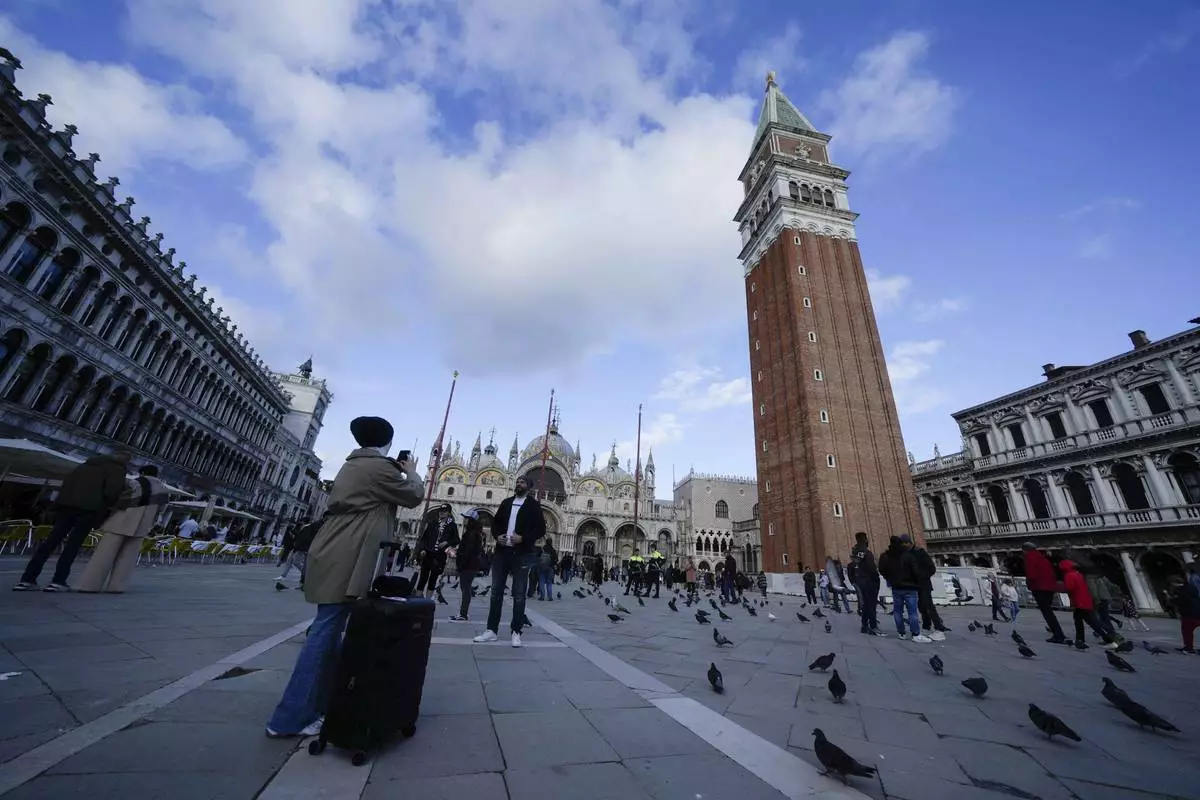
Tourists take pictures at the St. Mark square in Venice, Italy, Wednesday, April 24, 2024. The lagoon city of Venice begins a pilot program Thursday, April 25, 2024 to charge daytrippers a 5 euro entry fee that authorities hope will discourage tourists from arriving on peak days. Officials expect some 10,000 people will pay the fee to access the city on the first day, downloading a QR code to prove their payment. (AP Photo/Luca Bruno)
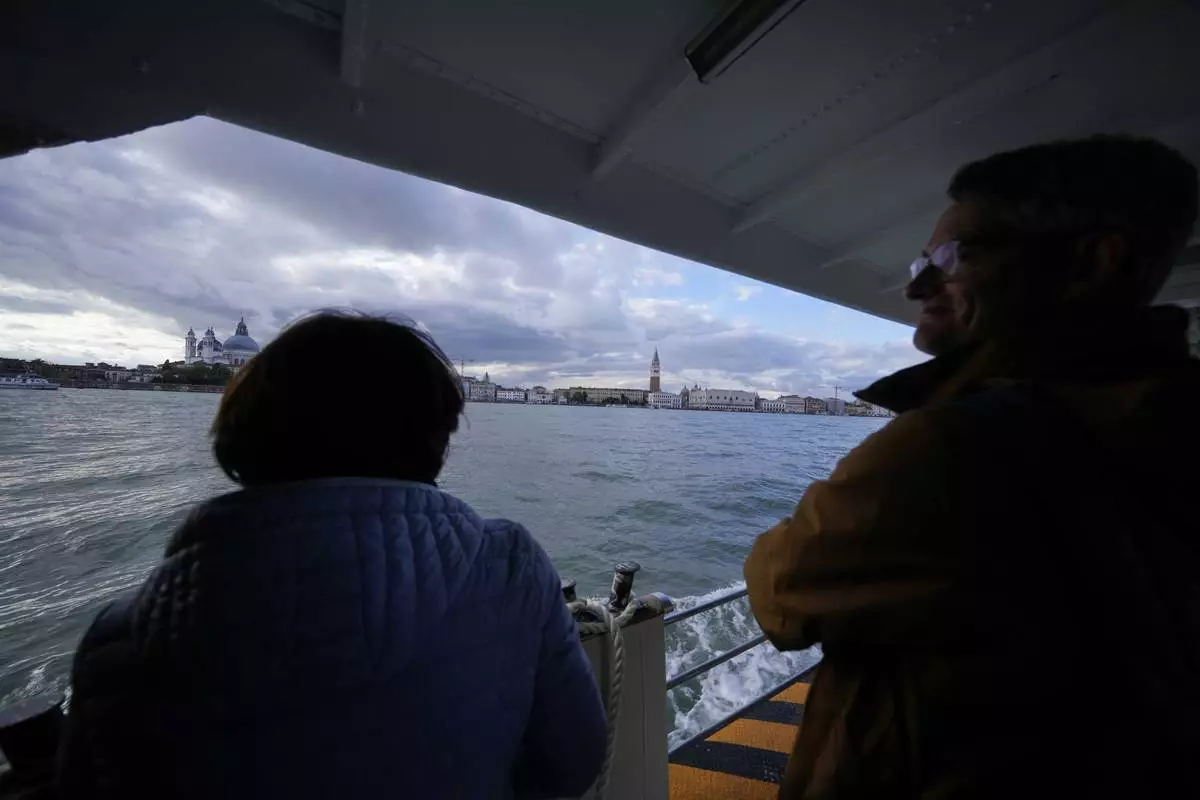
Tourists ride on a ferry boat in Venice, Italy, Wednesday, April 24, 2024. The lagoon city of Venice begins a pilot program Thursday, April 25, 2024 to charge daytrippers a 5 euro entry fee that authorities hope will discourage tourists from arriving on peak days. Officials expect some 10,000 people will pay the fee to access the city on the first day, downloading a QR code to prove their payment. (AP Photo/Luca Bruno)
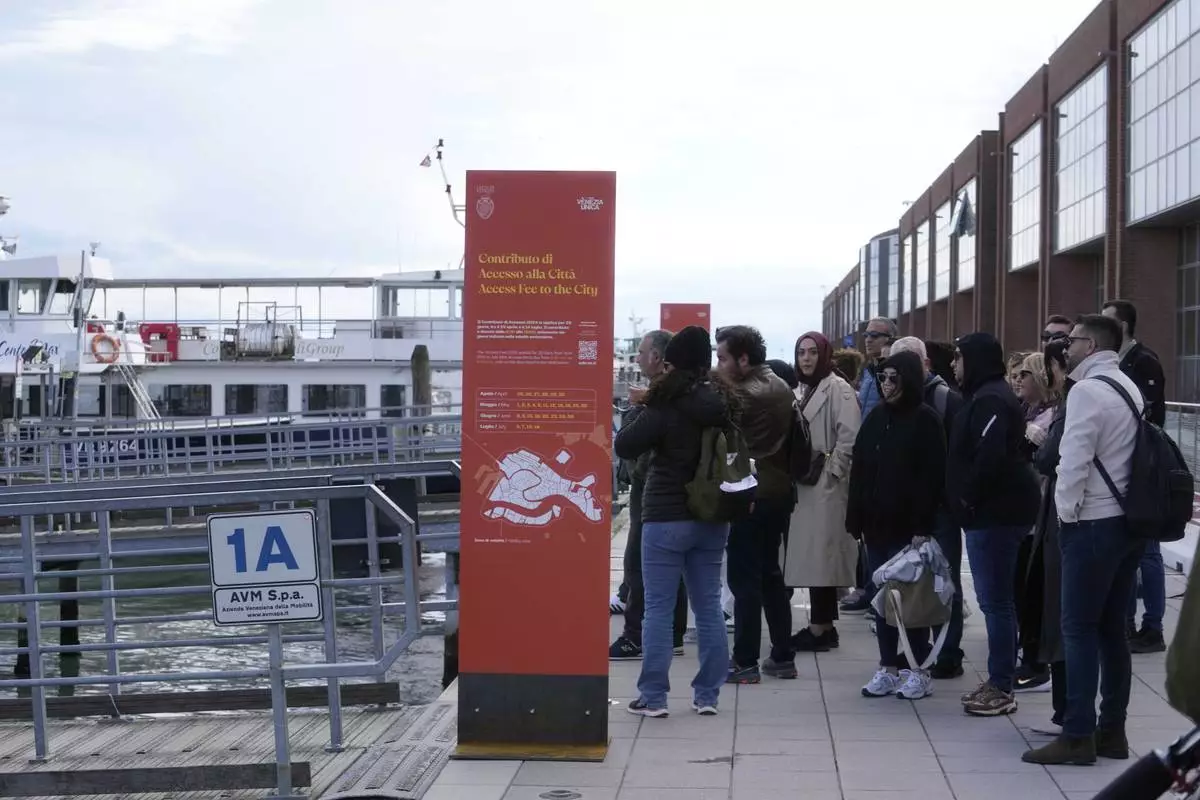
People stand in front of an information board explaining how to pay the tourist tax in Venice, Italy, Wednesday, April 24, 2024. The lagoon city of Venice begins a pilot program Thursday, April 25, 2024 to charge daytrippers a 5 euro entry fee that authorities hope will discourage tourists from arriving on peak days. Officials expect some 10,000 people will pay the fee to access the city on the first day, downloading a QR code to prove their payment. (AP Photo/Luca Bruno)
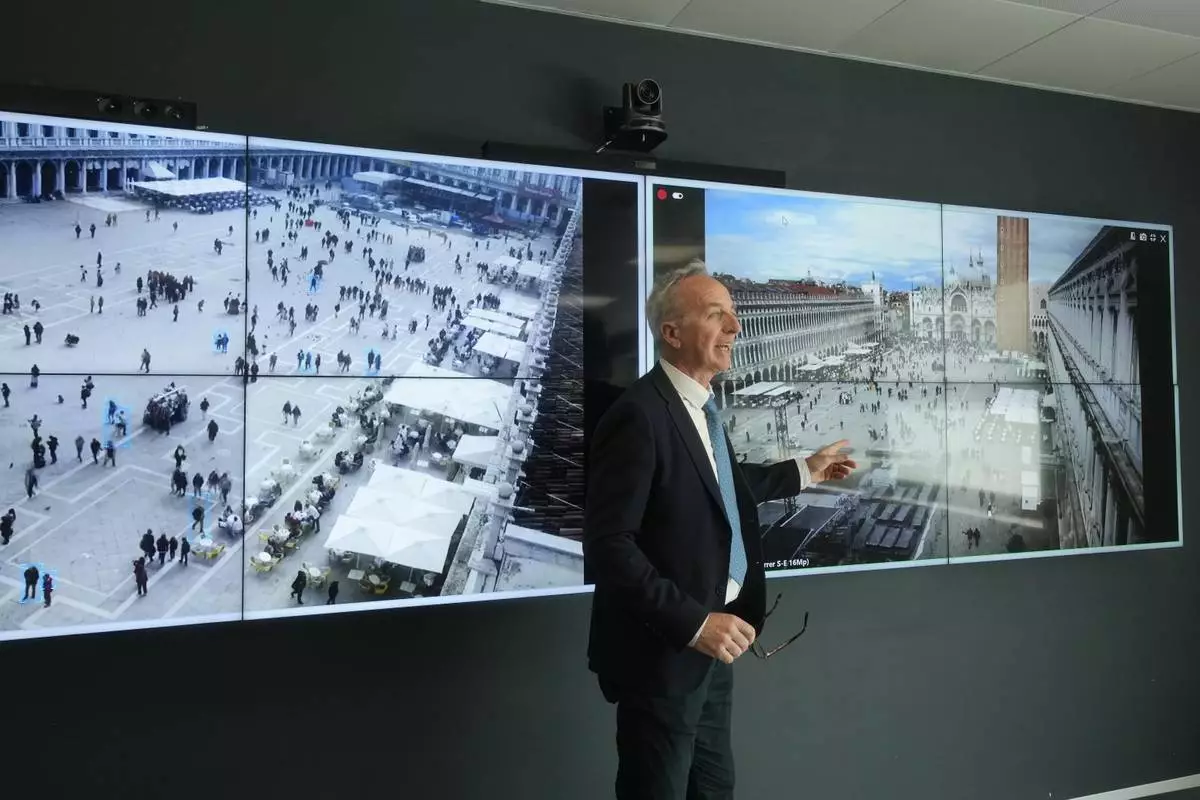
Marco Bettini, director of Venis Informatics System, gestures as he talks to reporters at the police Venice control room, in Venice, Italy, Wednesday, April 24, 2024. The lagoon city of Venice begins a pilot program Thursday, April 25, 2024 to charge daytrippers a 5 euro entry fee that authorities hope will discourage tourists from arriving on peak days. Officials expect some 10,000 people will pay the fee to access the city on the first day, downloading a QR code to prove their payment. (AP Photo/Luca Bruno)
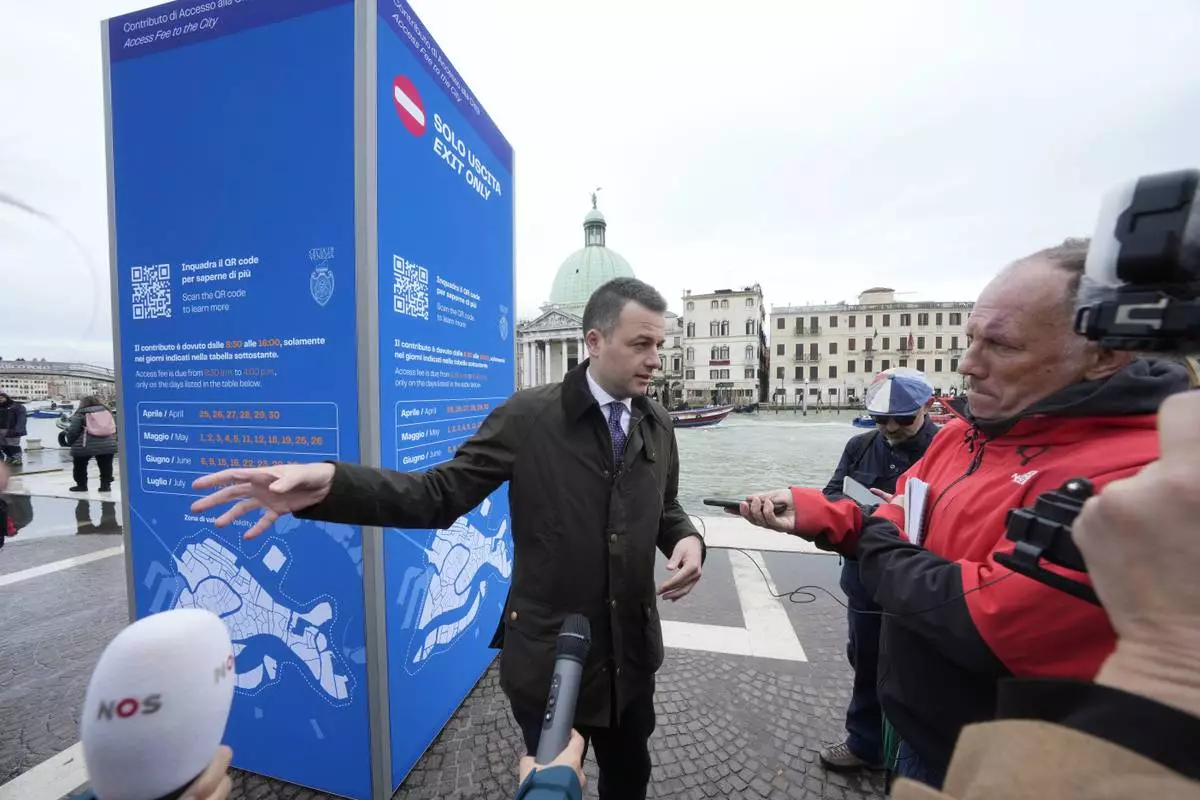
Venice councillor Simone Venturini speaks with reporters in front of a tourist tax totem in Venice, Italy, Wednesday, April 24, 2024. The lagoon city of Venice begins a pilot program Thursday, April 25, 2024 to charge daytrippers a 5 euro entry fee that authorities hope will discourage tourists from arriving on peak days. Officials expect some 10,000 people will pay the fee to access the city on the first day, downloading a QR code to prove their payment. (AP Photo/Luca Bruno)
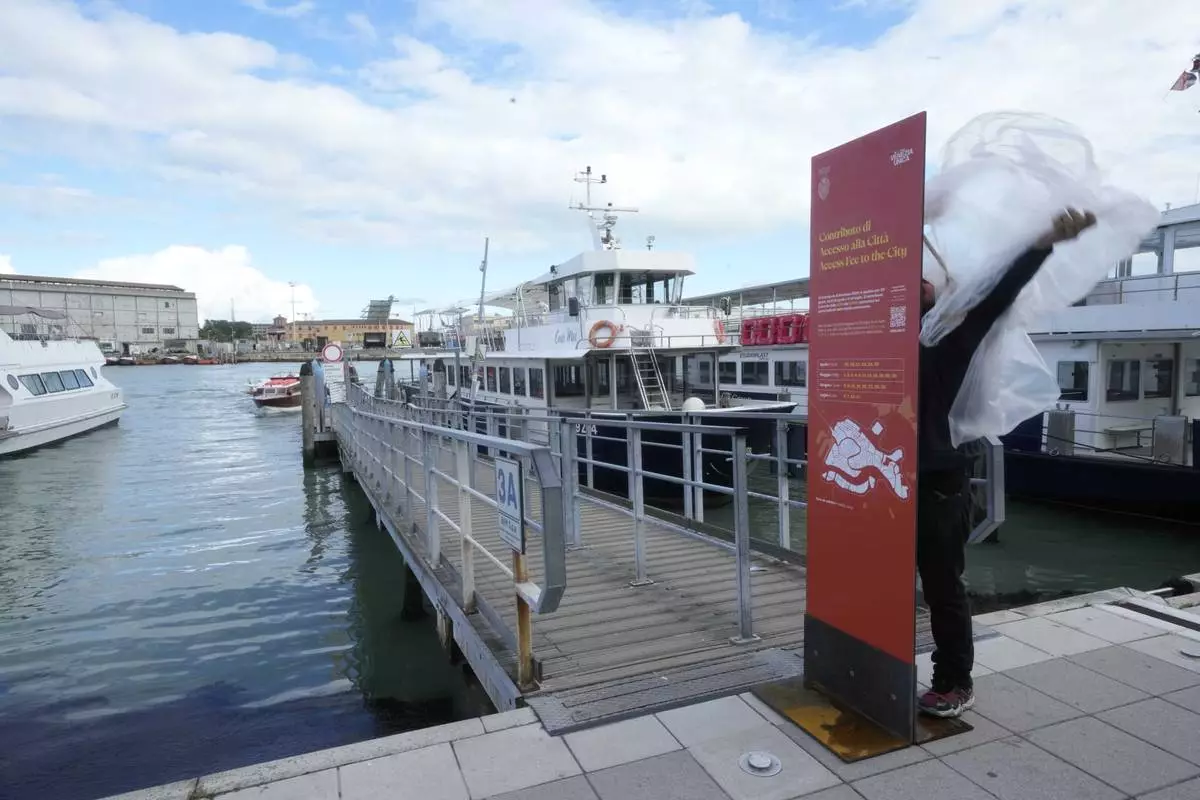
Workers prepare banner explaining how to pay the tourist tax in Venice, Italy, Wednesday, April 24, 2024. The lagoon city of Venice begins a pilot program Thursday, April 25, 2024 to charge daytrippers a 5 euro entry fee that authorities hope will discourage tourists from arriving on peak days. Officials expect some 10,000 people will pay the fee to access the city on the first day, downloading a QR code to prove their payment. (AP Photo/Luca Bruno)
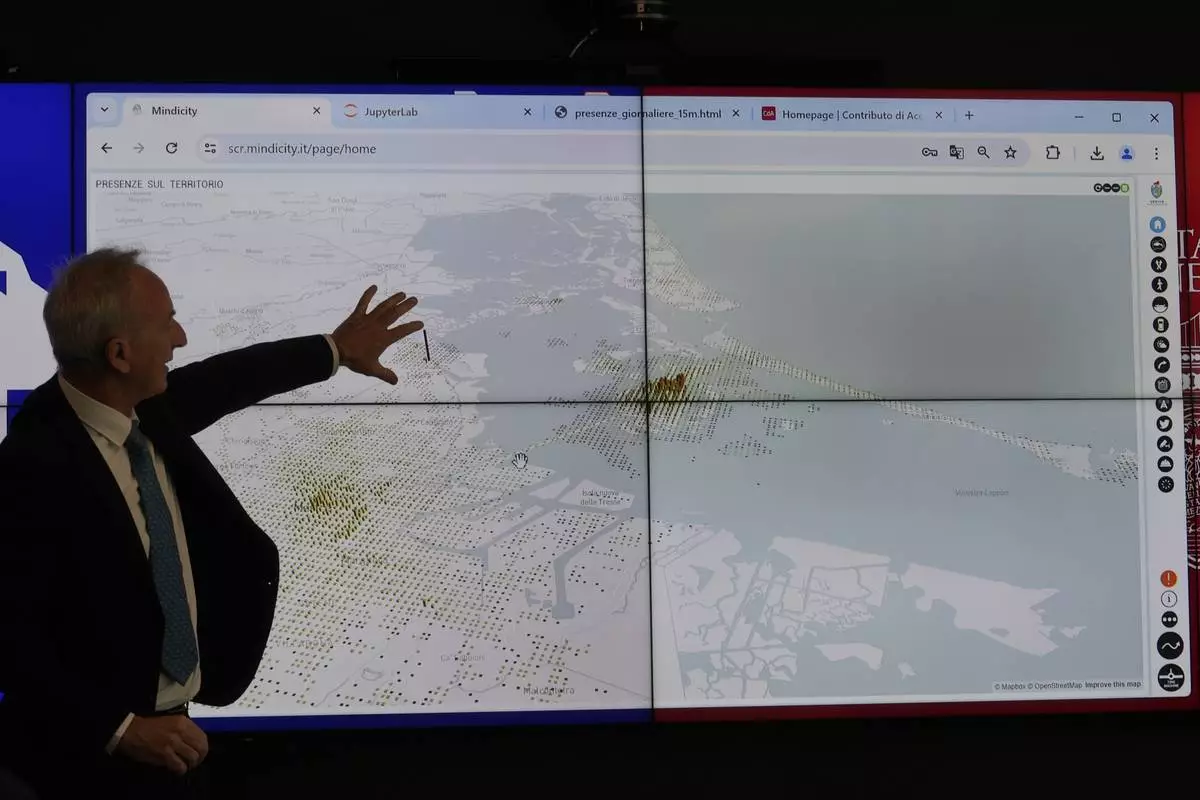
Marco Bettini, director of Venis Informatics System, gestures as he explains the Venice density to reporters at the police Venice control room in Venice, Italy, Wednesday, April 24, 2024. The lagoon city of Venice begins a pilot program Thursday, April 25, 2024 to charge daytrippers a 5 euro entry fee that authorities hope will discourage tourists from arriving on peak days. Officials expect some 10,000 people will pay the fee to access the city on the first day, downloading a QR code to prove their payment. (AP Photo/Luca Bruno)
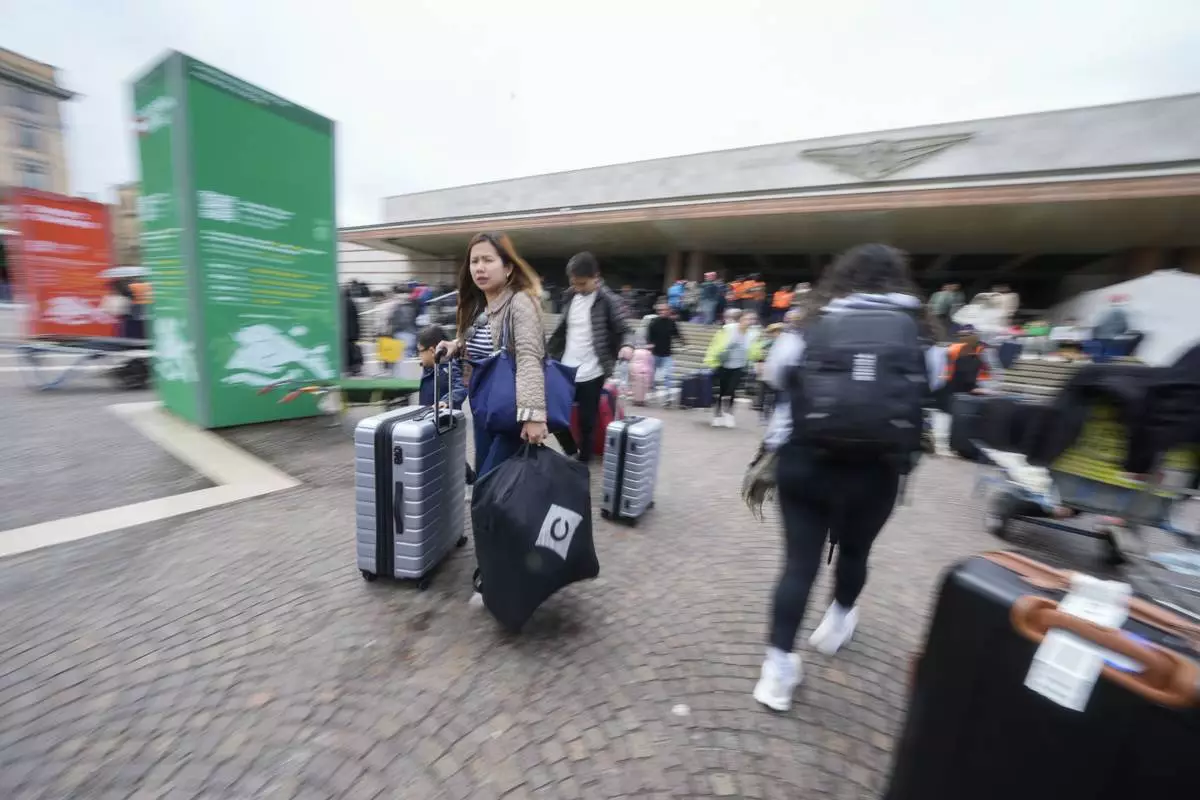
Tourists arrive at the main train station in Venice, Italy, Wednesday, April 24, 2024. The lagoon city of Venice begins a pilot program Thursday, April 25, 2024 to charge daytrippers a 5 euro entry fee that authorities hope will discourage tourists from arriving on peak days. Officials expect some 10,000 people will pay the fee to access the city on the first day, downloading a QR code to prove their payment. (AP Photo/Luca Bruno)
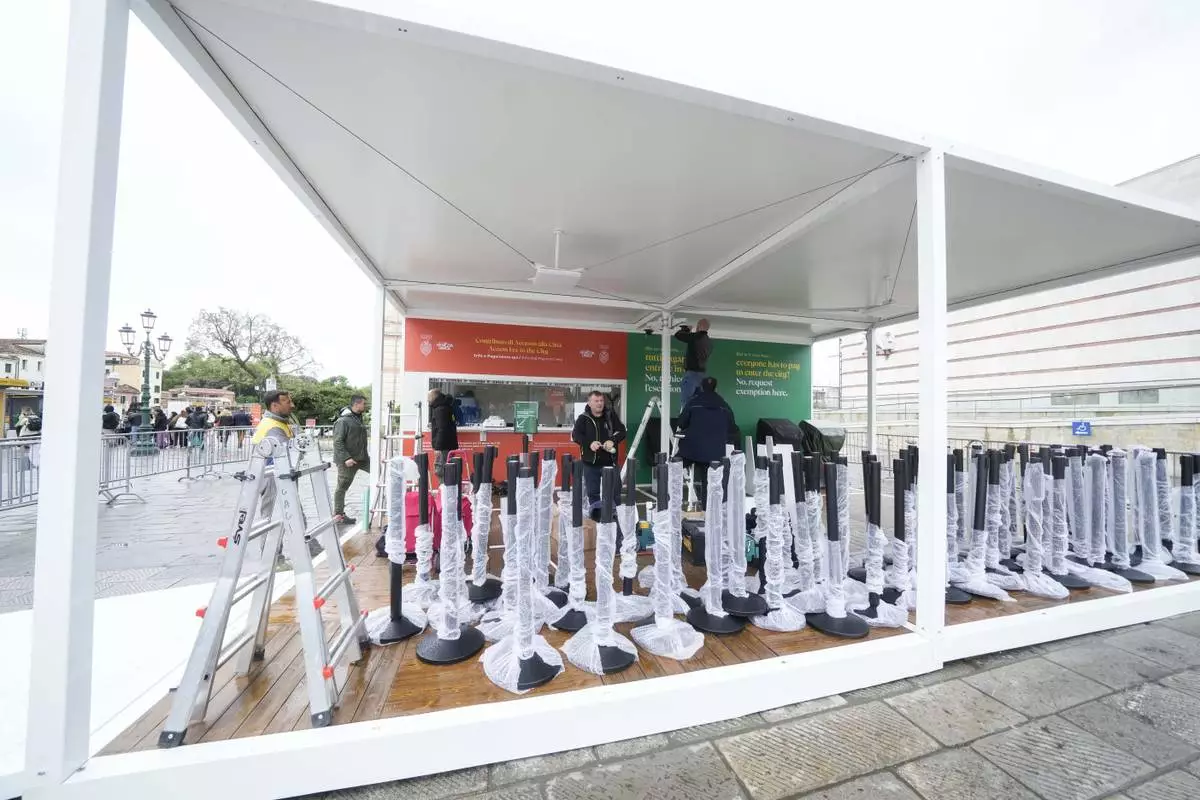
Workers prepare the tourist tax cashier desks outside the main train station in Venice, Italy, Wednesday, April 24, 2024. The lagoon city of Venice begins a pilot program Thursday, April 25, 2024 to charge daytrippers a 5 euro entry fee that authorities hope will discourage tourists from arriving on peak days. Officials expect some 10,000 people will pay the fee to access the city on the first day, downloading a QR code to prove their payment. (AP Photo/Luca Bruno)
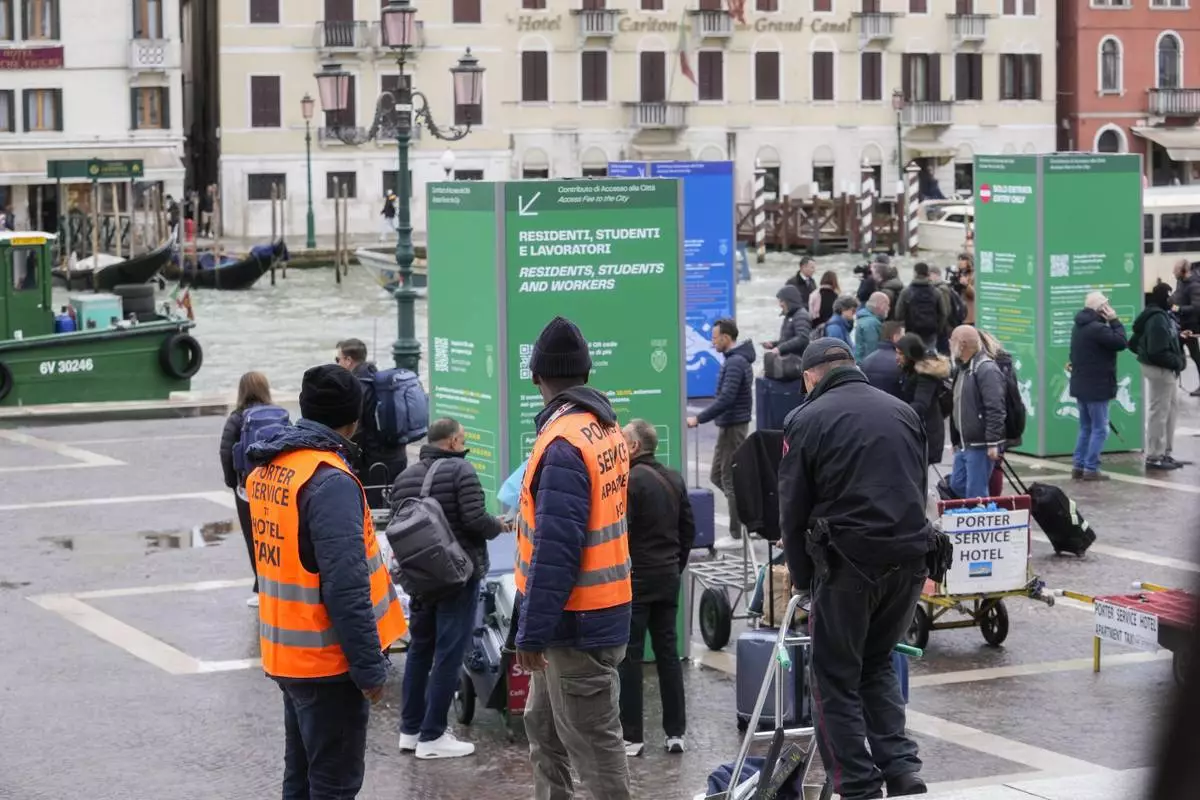
Porters wait for tourists outside the main train station in Venice, Italy, Wednesday, April 24, 2024. The lagoon city of Venice begins a pilot program Thursday, April 25, 2024 to charge daytrippers a 5 euro entry fee that authorities hope will discourage tourists from arriving on peak days. Officials expect some 10,000 people will pay the fee to access the city on the first day, downloading a QR code to prove their payment. (AP Photo/Luca Bruno)
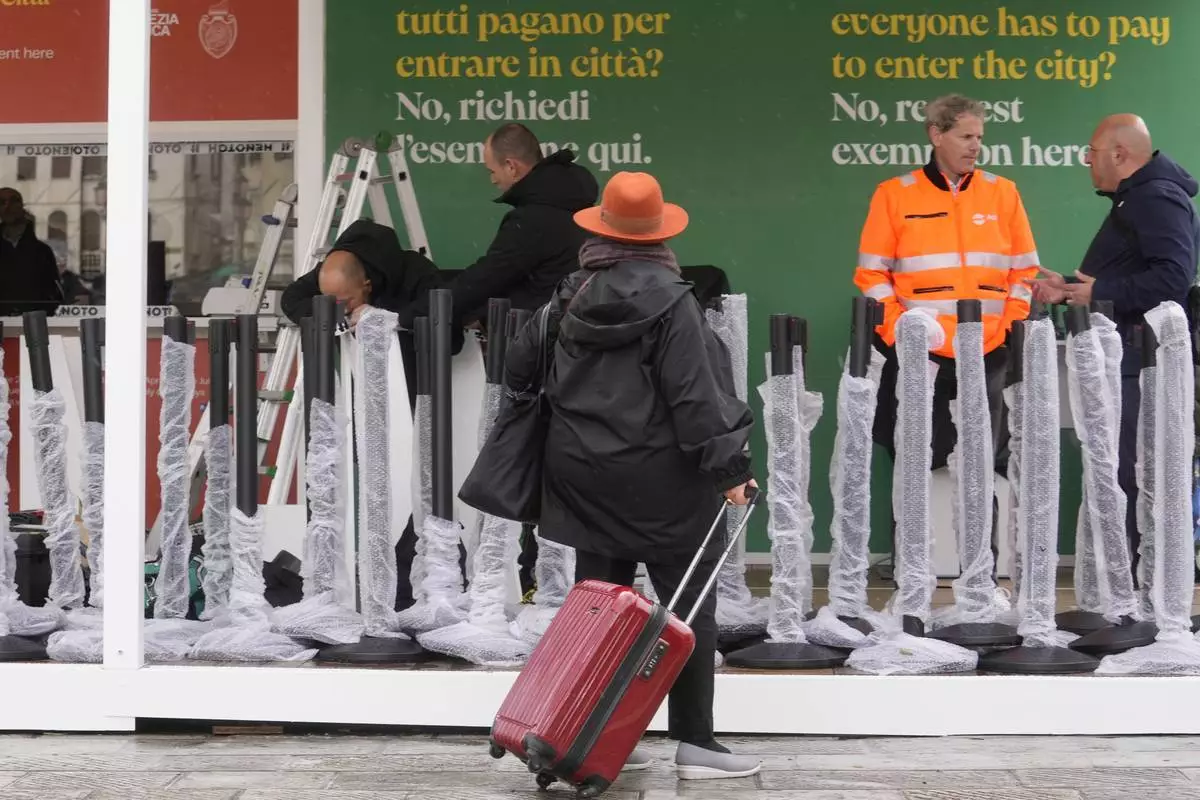
Workers prepare the tourist tax cashier desks outside the main train station in Venice, Italy, Wednesday, April 24, 2024. The lagoon city of Venice begins a pilot program Thursday, April 25, 2024 to charge daytrippers a 5 euro entry fee that authorities hope will discourage tourists from arriving on peak days. Officials expect some 10,000 people will pay the fee to access the city on the first day, downloading a QR code to prove their payment. (AP Photo/Luca Bruno)
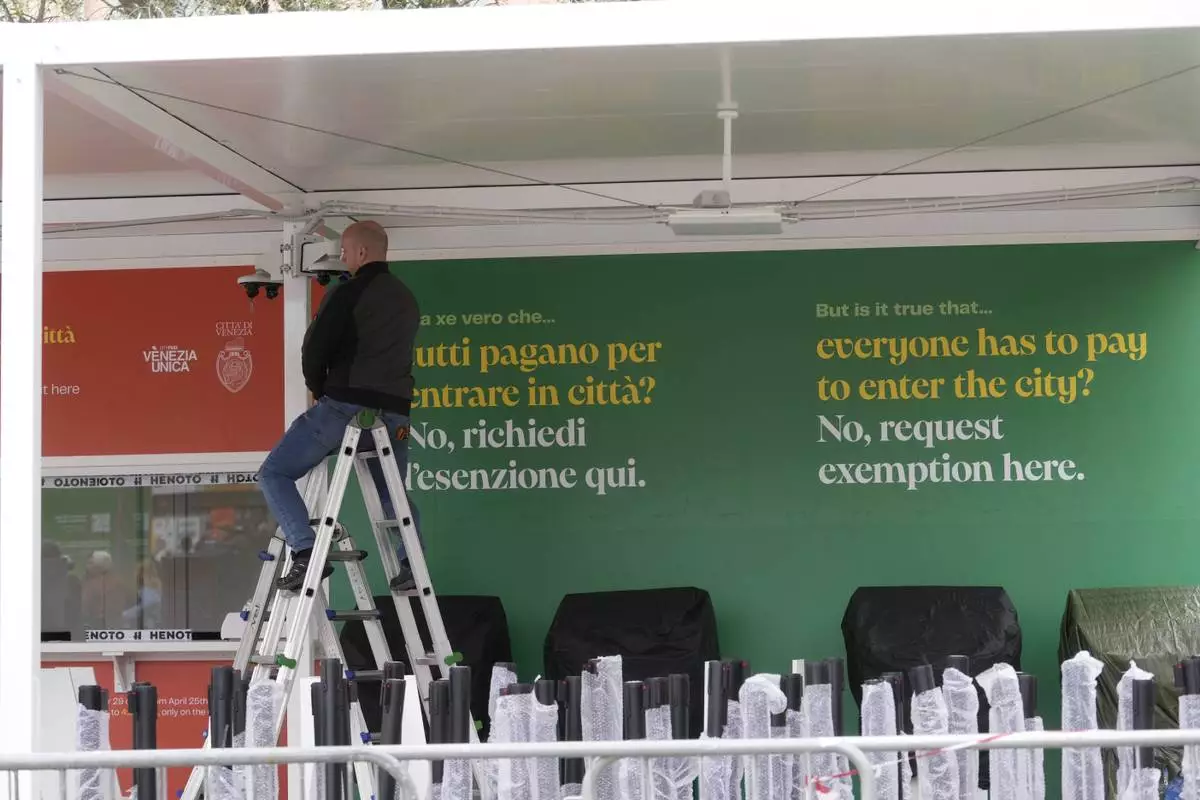
Workers prepare the tourist tax cashier desks outside the main train station in Venice, Italy, Wednesday, April 24, 2024. The lagoon city of Venice begins a pilot program Thursday, April 25, 2024 to charge daytrippers a 5 euro entry fee that authorities hope will discourage tourists from arriving on peak days. Officials expect some 10,000 people will pay the fee to access the city on the first day, downloading a QR code to prove their payment. (AP Photo/Luca Bruno)
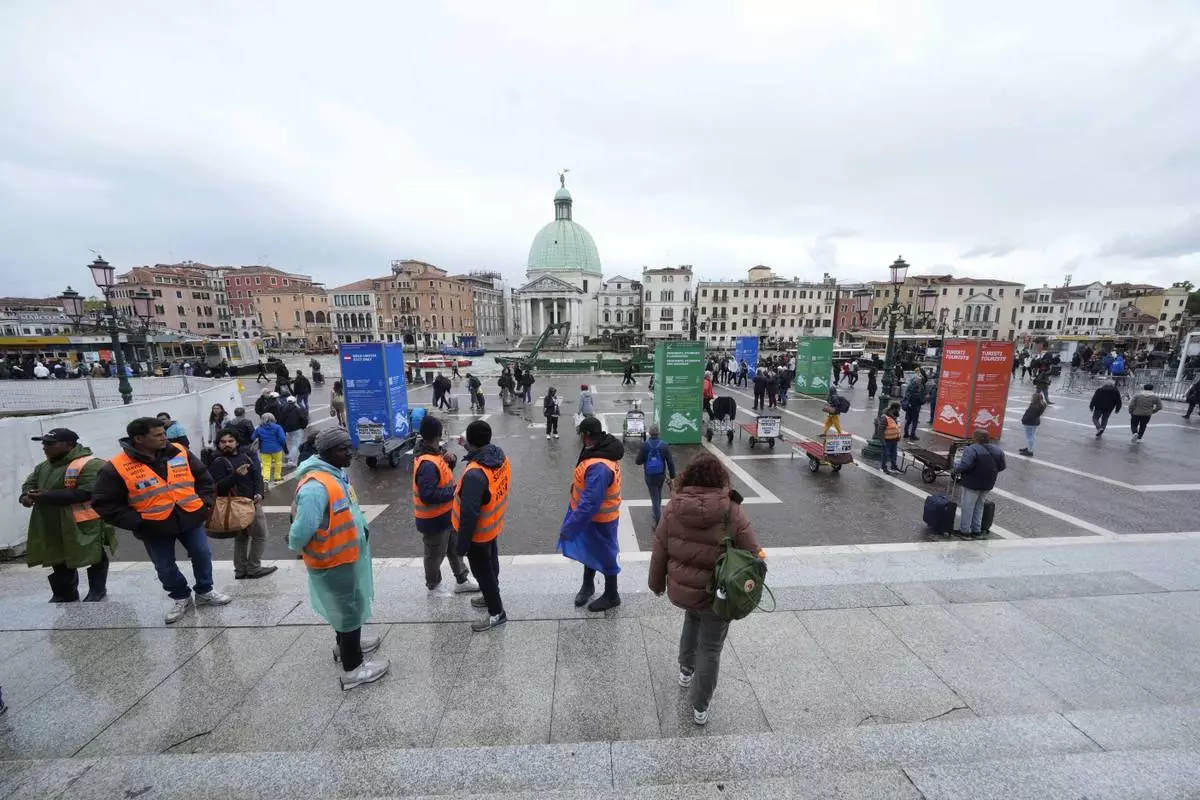
Porters wait for tourists outside the main train station in Venice, Italy, Wednesday, April 24, 2024. The lagoon city of Venice begins a pilot program Thursday, April 25, 2024 to charge daytrippers a 5 euro entry fee that authorities hope will discourage tourists from arriving on peak days. Officials expect some 10,000 people will pay the fee to access the city on the first day, downloading a QR code to prove their payment. (AP Photo/Luca Bruno)
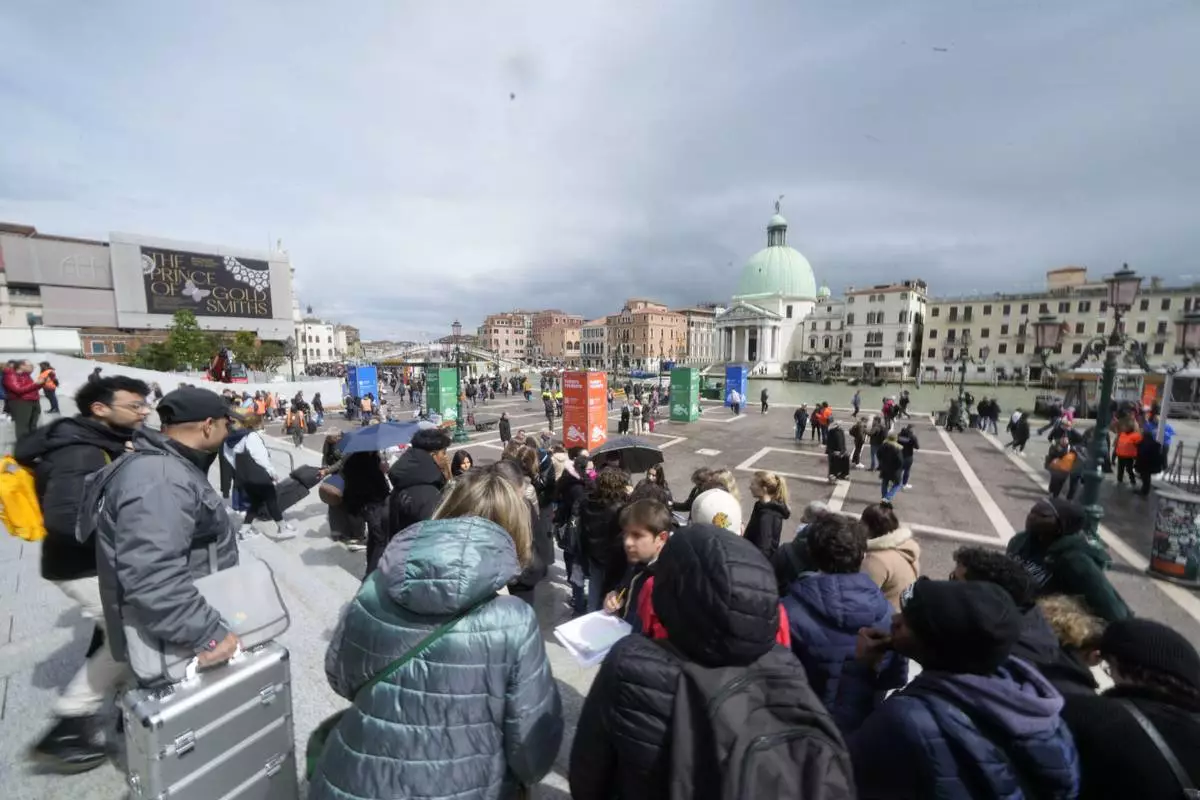
Tourists arrive outside the main train station in Venice, Italy, Wednesday, April 24, 2024. The lagoon city of Venice begins a pilot program Thursday, April 25, 2024 to charge daytrippers a 5 euro entry fee that authorities hope will discourage tourists from arriving on peak days. Officials expect some 10,000 people will pay the fee to access the city on the first day, downloading a QR code to prove their payment. (AP Photo/Luca Bruno)
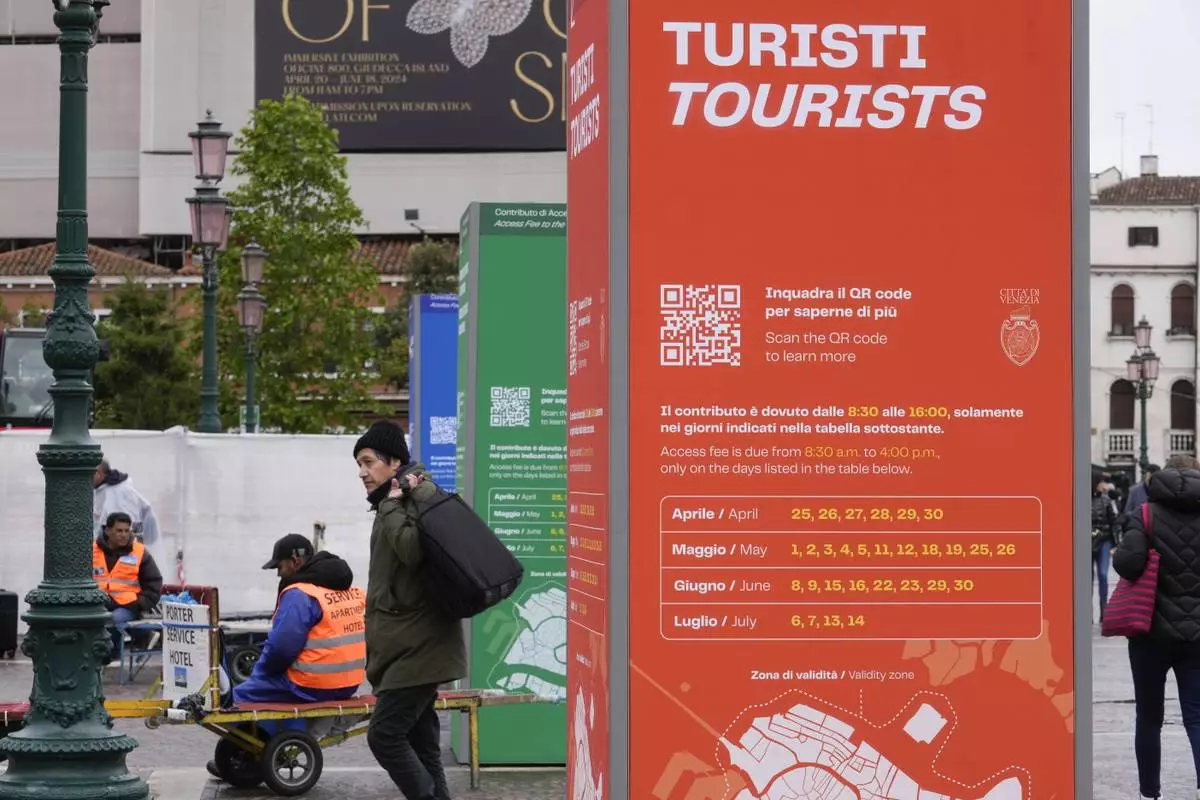
Tourist information boards are seen outside the main train station in Venice, Italy, Wednesday, April 24, 2024. The lagoon city of Venice begins a pilot program Thursday, April 25, 2024 to charge daytrippers a 5 euro entry fee that authorities hope will discourage tourists from arriving on peak days. Officials expect some 10,000 people will pay the fee to access the city on the first day, downloading a QR code to prove their payment. (AP Photo/Luca Bruno)
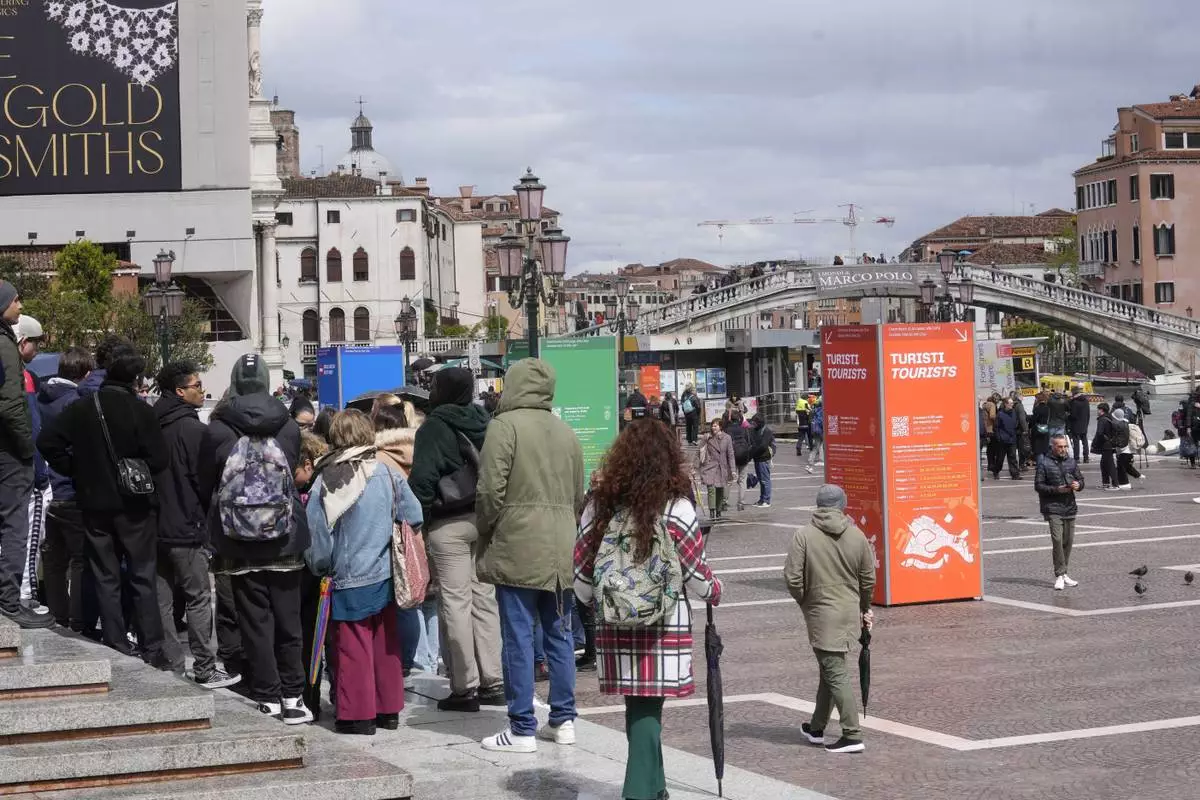
Tourists arrive outside the main train station in Venice, Italy, Wednesday, April 24, 2024. The lagoon city of Venice begins a pilot program Thursday, April 25, 2024 to charge daytrippers a 5 euro entry fee that authorities hope will discourage tourists from arriving on peak days. Officials expect some 10,000 people will pay the fee to access the city on the first day, downloading a QR code to prove their payment. (AP Photo/Luca Bruno)

























